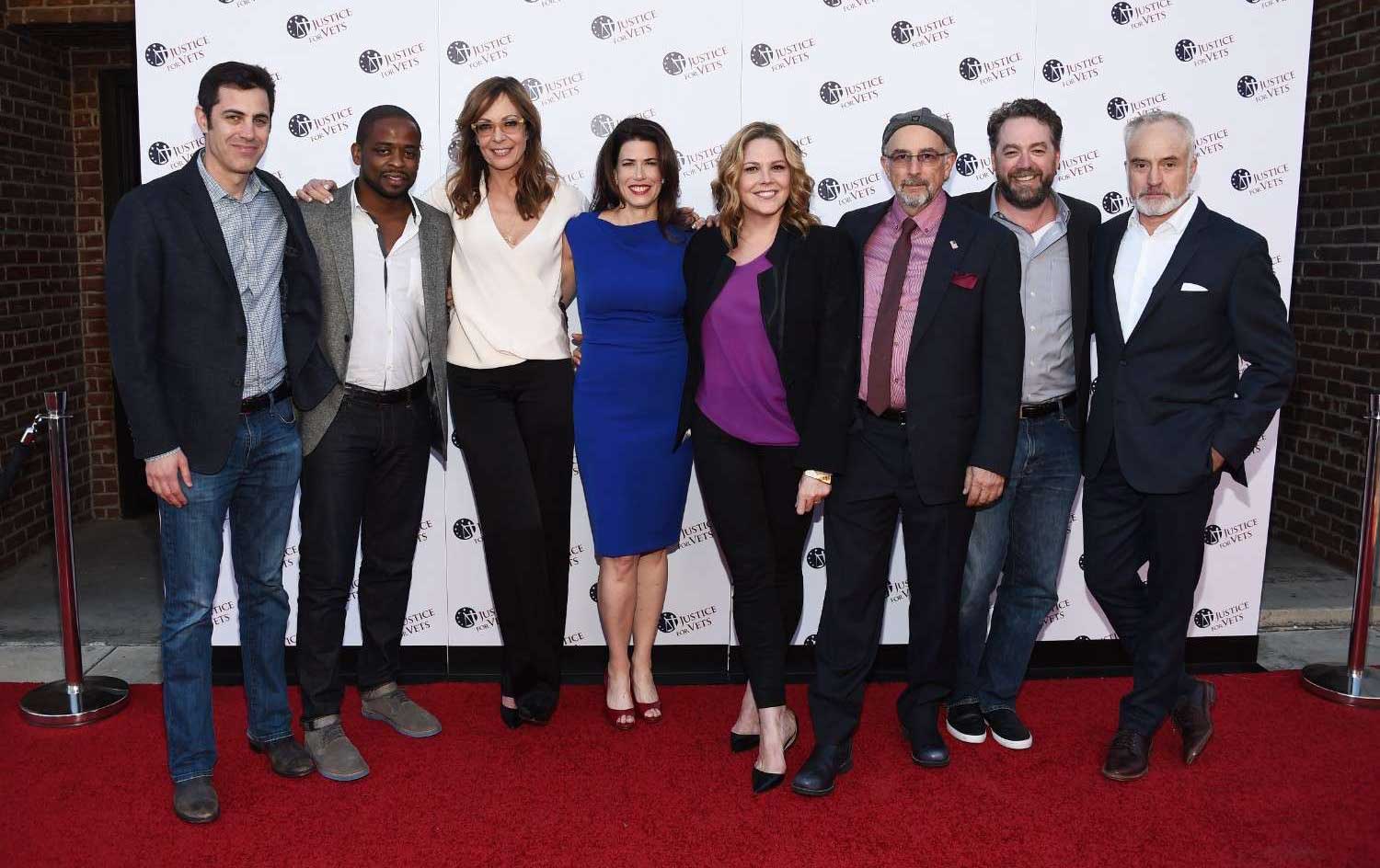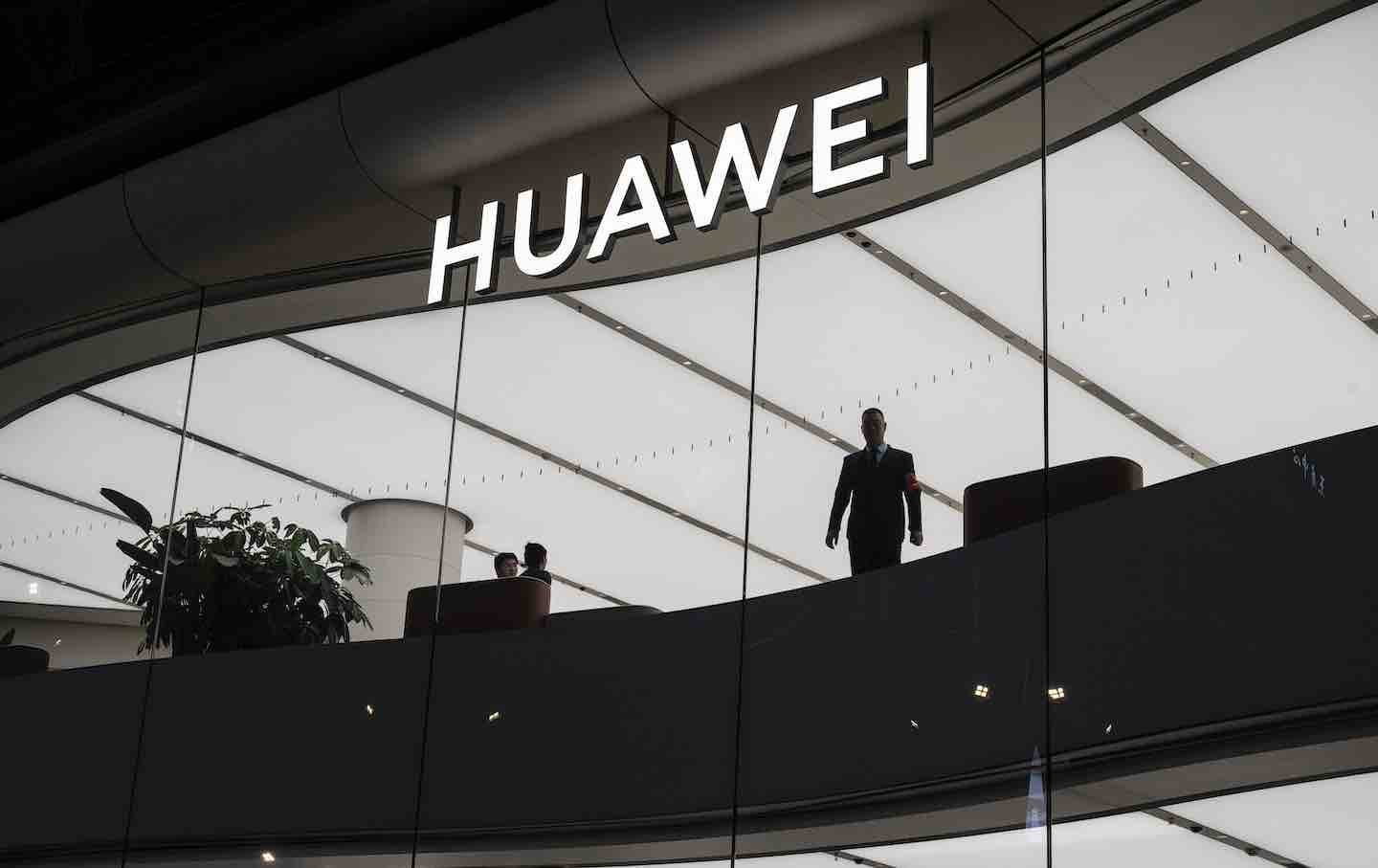The World’s Longest Management Memo
Marty Baron’s boardroom-first vision of how journalism should be organized.
What Happened to “The Washington Post” Under Marty Baron?
In a new book, the former editor tirelessly hymns how he and the newspaper protected their journalists and shored up the foundations of our crumbling republic. But was that the case?

Martin Baron announcing that he is leaving The Boston Globe to become the executive editor of The Washington Post.
(Photo by Yoon S. Byun / Getty)Early on in Collision of Power, former Washington Post editor Marty Baron telegraphs one of the book’s signature reporting methods: going back to former Post colleagues and soliciting their memories of key events that shaped his decade-long tenure atop the storied newspaper and that almost always flatter his leadership and that of the newspaper’s management more generally. He starts out by polling media reporter Paul Farhi, asking him to recall how Jeff Bezos handled questions about his pending purchase of the Post. Farhi recollects that Bezos was refreshingly candid, indeed even “friendly and chatty,” and told Farhi that he thought his vast storehouse of wealth would help the Post position itself on the “runway” toward profitability. Baron then reminds readers that he also helped smooth Bezos’s landing on this runway. As word spread of Bezos’s purchase of the paper, Baron went about arranging for him to meet with the other leaders of the newsroom in order to “demonstrate” the retail baron’s “genuine interest in journalism.”
Books in review
Collision of Power: Trump, Bezos, and the Washington Post
Buy this bookMost of the remembrances making up Baron’s longsome account of his career at the Post follow this same numbing narrative arc: The former boss solicits impressions from his erstwhile employees and colleagues, who tend, unsurprisingly, to confirm the managerial savvy and rock-solid editorial judgment of Baron. Many of Baron’s sources, after all, still depend on his good will for their basic job security and career advancement. Baron, who delivers long and earnest sermons throughout Collision of Power on the sacrosanct practices of journalistic objectivity and transparency, never pauses once to note this first-order reporting conflict.
At times, the unchecked power dynamic at the center of Collision of Power delivers revealing and unselfconsciously comic results. Discussing a former reporter on the Post’s investigative team who had gone public with her disappointment over not being named investigations editor, he notes that she eventually would write him a fawning note after her departure: “Placing me ‘at the top of the list’ among ‘the great role models I’ve been fortunate to have,’ she emailed, ‘I am grateful for my time at the Post, which prepared me for this next step; and for the wisdom I received from you and all the excellent people I worked with.’” But at other times it speak volumes about another major through line of The Collision of Power: More than serving as the stirring case study in independent news-gathering, as touted in the book’s jacket copy, Baron’s memoir dilates obsessively on the varied mandates of news management in a digitally addled, increasingly Trumpified infosphere. His is very much a book for and by bosses.
At virtually every moment when workplace politics obtrudes into his prerogatives as a manager, one can feel his frustration and anger mounting. Recounting the aftermath of a fractious town hall meeting the Post convened to discuss its coverage of the 2020 protests after the police murder of George Floyd, Baron recalls not a searching conversation among colleagues. Instead, he fumes about how he felt like his “professional reputation, more than four decades in the making, was about to be unjustly shredded.” That he, the paper’s editorial boss, had to field notes from the staff was one matter—that this challenge to his managerial authority was also coming from the union only made him more furious: “I also had grown weary of well-meaning but moralistic young journalists—and their forever enabling union—lecturing me on best management practices when precious few had ever managed anyone, had any experience with budget constraints, had ever been tasked to compete in hiring and retaining diverse talent, had ever worked for bosses as demanding as my own, or had any appreciation for the difficult task of meeting ambitious growth goals that bestowed benefits on all of them.”
Baron’s outbursts are, of course, completely tone-deaf on their own. But they also convey his boardroom-first vision of how journalism should be organized. For all Baron’s carefully vetted standing as a high priest of journalistic objectivity, his book teems with professional-class resentment. Like a derivative stand-up comic cataloging the sins of wokeness, he goes on and on about newsroom unions—“their belligerent portrayal of managers as malefactors, willful ignorance of what’s required to run a sustainable business, self-righteous moralizing, and reflexive opposition to upholding customary standards of employee behavior.” He also never once pauses to consider why such undeferential attitudes are eminently justifiable responses, and indeed urgently needed survival skills, in an industry that’s shedding benefits and jobs amid a roiling and perennial crisis. For all the inherent drama of his book’s subjects—from Edward Snowden’s revelations about the national surveillance state to the Saudi regime’s murder of Jamal Khashoggi to the Trump administration’s overlapping wars on the press and the democratic process—it ends up reading mostly like the world’s longest management memo.
Like such communiqués, Collision of Power dotes on the glories of the great institution at the center of its narrative. It tirelessly hymns the indispensable role The Washington Post has played, and continues to play, not only in securing the well-being of its workers but also in shoring up the foundations of the crumbling American republic. Sizing up his legacy at the paper, Baron returns again and again to his conviction that democracy not only dies in darkness but that it would also likely die without the Post. “I felt confident that a reinvigorated Washington Post,” he tells his readers, “had fulfilled its duty to the American people and a fragile democracy. A president had waged war against us, but we kept at our work. Never had the work been more urgent.”
Baron’s book indulges in this mode of cringe-making hyperbole throughout its account of his tenure in office. He cannot stop telling us about the great achievements of management—most especially the exploits of centi-billionaire Bezos, whom Baron lauds as the Weltgeist on horseback dispatched to rescue a then-foundering Post from “fiscal failure and its inevitable end result, journalistic irrelevance.” Baron reports that when he learned of Bezos’ $250 million deal to acquire the paper, he was wary of being thrust into a professional alliance with one of the wealthiest men on the planet—who wouldn’t be, after all? But he soon found all his worries assuaged. Bezos “presented himself as pragmatic and nonideological,” Baron reports. He unsurprisingly “believes business is overregulated,” but he also “sees government as having an essential role in addressing certain mammoth societal problems” such as climate change. He “values stability and moderation” and is “confident of the nation’s future regardless of whether it leaned a bit to the right or left but not if it went to extremes.” He is also—woe betide us all!—“frustrated by a culture of personal vilification in the public sphere” and reportedly considers “ad hominem attacks directed at him from politicians like Senators Elizabeth Warren and Bernie Sanders akin to Trump’s own demonizing rhetoric.” In other words, Bezos is a stunningly complacent, stupendously wealthy, fatally incurious CEO who subscribes to the most played-out clichés of elite political affiliation—most of all, the Beltway shibboleth dating from the 2016 campaign that democratic socialist Sanders and incipient fascist Trump are two sides of the same coin and thus only centrist elites in the center can truly save democracy.
When it comes to the newspaper, too, Baron believes only one group should be in power: the bosses. His hostility to unionized workforces is but one telling symptom of this derangement, but others abound. For starters, there’s the Post’s steady gigification of content provision. Baron proudly reports on how one of the early initiatives launched under Bezos’s ownership was the paper’s “Morning Mix” team of news aggregators, poised to deliver just-in-time takes en masse, combining original reporting with repurposed accounts of breaking news stories from a range of sources, all in the quest for enhanced digital reach and virality; in order to sidestep an “assault from traditionalists” (read union members), Baron had the project’s leader, Fred Barbash, report to him directly. “Post Everything” applied the same just-in-time model of content delivery to opinion and commentary offerings. Meanwhile, a battery of data-visualization and social media mavens came on board to expedite the general speed-up.
Crowning this massive lurch into labor casualization was the launch of the Post’s Talent Network, a clearinghouse of freelance contributors aimed at expanding the paper’s geographical pool of writers at low piecework rates. (I can testify to this latter trend, personally having been compelled to register in the database for contributions to the Post’s op-ed section.) Baron proudly recounts how he charged the project leader of this launch to envision the Talent Network as “the journalistic version of TaskRabbit (freelance labor for everyday tasks) and Amazon’s Mechanical Turk (a crowd-sourcing site for on-demand business tasks)…. Overnight, it dramatically expanded the journalistic reach of the Post at a bargain-basement price.”
This race-to-the-bottom model of content provision is, to put things mildly, a dismaying vision of how the work of journalism should be organized and rewarded for a paper publishing under the self-important masthead motto “Democracy Dies in Darkness.” The Post’s preferred version of democracy on Baron’s watch had vanishingly little to do with democracy in the workplace and a great deal to do with Bezos’s storied determination to wrest maximum surplus value from a disempowered workforce. In another unwittingly comic demonstration of Baron’s own blinkered worldview, he primly records how he deliberately refrained from reading Brad Stone’s exposé of the gruesome business practices at the heart of the Amazon monopoly, The Everything Store, “so that my own impressions would be free of outside influence.”
Baron’s enthusiastic account of the gigified workplace protocols at the Post also tends to sit awkwardly alongside his later lamentations about how Post staffers, bewitched by the instant catharsis of opinion to be had on Twitter and other social media, wanted to throw aside the hallowed pose of journalistic objectivity in favor of political advocacy during the 2020 wave of Black Lives Matter protests. Clearly, when it came to harvesting content engineered for maximal virality at low prices, Baron didn’t blanch at the ungainly bumptiousness of the online mediasphere. But after he deemed that Post-aligned social media content might create reputational harm for either himself or the paper’s brand, he lowered the boom—most infamously when Post reporter Felicia Sonmez tweeted out a link to a Daily Beast story revisiting the ugly gender politics of Kobe Bryant’s 2003 rape case after the news broke that the Lakers star had died. Sonmez’s tweet sparked a massive backlash on the platform but also in the Post’s newsroom: Baron, he tells readers, was “livid” over the reporter’s alleged lack of restraint, and she received a one-day suspension over the tweet.
Baron cites this episode alongside another in which he and Post management sought to curb the posts of politics reporter Wesley Lowery after he had become increasingly vocal on Twitter about the media’s diffident and cowardly approach to describing racist invective from Trump and others on the MAGA right. Lowery rightly called out a New York Times 10-year retrospective on the Tea Party for downplaying the racial animus behind the movement, and he also was critical of newsroom managers (without naming the Post) for failing to plainly characterize Trump’s racist tirades for what they were. Yet just the suggestion that managerial protocols might be fodder for criticism from workers was enough to provoke Baron and other senior managers at the newspaper to set Lowery on a path to his eventual resignation from the paper. At an ensuing meeting in Baron’s office, Lowery explained to those gathered that the Post didn’t “own” him, and Baron responded by dismissing his comments as “insolent.”
In Baron’s view, the Post’s employees should do as their bosses say, but its journalists also should not speak for themselves; only the journalism itself, without any unseemly opinion or editorializing from its reporters, should represent the Washington Post brand. “Participation by journalists in the very events our news organizations covered–whether through marches or donations or social media–risked undermining public confidence in the independence and professionalism of our work,” he writes. “The cause of public understanding would not be well served if our journalists were seen as indistinguishable from activists.”
Here one finds yet another set of just-so management shibboleths that come encased in an attractive veneer of common sense but that rapidly collapse under scrutiny. To begin with, social media usage is a very different from marching or issue-based donating is, and it is hardly cognate with journalists participating in the events they are covering. But beyond that, it’s hard to conjure any cognitive world, even prior to the Internet’s arrival, in which vital political reporting simply “speaks for itself.” The Ur-text of the Post’s modern-day reputation, its Nixon-era reporting, is a case in point. Several key developments in the story of Nixon’s corruption and multifront campaigns of political vengeance weren’t advanced by news teams at the Post or The New York Times but by the crusading opinion columnist Jack Anderson, derided by the apostles of objectivity at Newsweek as a “pitiless, self-appointed judge of human propriety” and actually targeted for assassination by Nixon’s unhinged White House. Going further back, of course, modern investigative journalism was the creation of socially conscious reformers, from Ida Tarbell and Lincoln Steffens to Henry Demarest Lloyd and Matthew Josephson.
In reality, Baron’s dispassionate model of press neutrality has little to do with journalistic standards and much to do with the prescriptive, conflict-averse model of news gathering and professional conduct allied with the matriculation of a privileged cadre of managers into the organs of American journalism. As a former corps of working-class journalists and newspaper editors has been supplanted by a caste of duly credentialed professionals and technocratic knowledge merchants, a cult of neutrality has emerged as a touchstone of a profession once unafraid to be political. Baron makes this class-bound directive explicit as he draws on the examples of other elite vocations in its defense: “Like everyone else.…,” he writes,
We want doctors to be objective in diagnosing the medical conditions of their patients, uncontaminated by bigotry or baseless hunches. We want medical researchers and regulators to be objective in determining whether new drugs might work and can be safely consumed. We want scientists to be objective in evaluating the impact of chemicals in the soil, air, and water…. In business, we want objectivity, too. Applicants for bank loans and credit cards should be evaluated on valid criteria, not on biases about race or ethnicity or other factors that are similarly irrelevant.
Popular
“swipe left below to view more authors”Swipe →Baron clearly intends this litany of professional analogies to be argument-clinching, but if anything, it clarifies how the standards of neutrality he reveres have little to do with journalism as a profession. For while many of these other undertakings conform to his high-managerial vision of right conduct, deference, and respectability in the workplace, the field of journalism is charged with a very different and far more public mission: It is supposed to furnish the public with material to sustain civic deliberation and spur the public’s conscience. Journalists’ pursuits of the facts would be little more than arid formalism unless executed with the aim of changing people’s views of the world; they want to inform public opinion, and in this way they aspire to help empower the public into action. By contrast, Baron seems far more interested in having a small class of experts and elites do most of the acting.
Throughout these impartiality sermons, Baron resists making this antidemocratic strain explicit. He and his paper have, after all, loudly professed their dedication to safeguarding the beleaguered American experiment in self-government throughout the Trump era. (Though it is telling that, as Bezos, Baron, and company were workshopping possible new slogans for the paper, “Toward a More Perfect Union” was an early casualty on the cutting room floor, “rejected lest it summon thoughts of our own workforce union,” Baron writes.) Still, the specter of top-down discursive government by experts runs through Baron’s brief for the sacrosanct mandate of objectivity in American newsrooms. It can also be found in his sources: Baron cites Walter Lippmann and his 1920 book Liberty and the News, which decried an emerging mass media for sowing “inconceivable confusion” among a beleaguered American citizenry, as a key inspiration for his own arguments. But Baron studiously avoids quoting from or engaging with Lippmann’s follow-up tract Public Opinion, which argues that the impartiality of a journalistic elite was essential precisely because the model of democratic deliberation underwriting American government in the 20th century was unsuited to the complexities of life in a mass society. In this new age, it was time to give up on democracy and deliver the sensitive and crucial conduct of public affairs into the hands of an expert class of professional and managerial elites that knew what it was doing.
Baron avoids accepting the profound fatalism of Lippmann’s proposed divorce of knowledge professionals from the public weal. The public should, in Baron’s view, still play a role in setting social agendas, but when it comes to the actual, forbidding work of reclaiming the public weal in the face of authoritarian malice, Baron offers little more than a set of vague, pep-rally-style bromides. Since journalists can’t break from Baron’s imposed law of impartiality, Baron insists that the job of defenestrating Trump must fall to the public at large—yet it’s anyone’s guess just how the public is meant to carry off this task.
What he does propose also ends up not being much more than another unhelpful bromide: He boils down the press’s role to a simple formula: “Report hard. Unflinchingly publish what we know. Avoid unnecessary inflammatory language. Don’t give Trump and his allies ammunition against us. The American people can then decide whether they want more of Trumpism.” On the surface, this prescription seems reasonable enough, but the mandate to report events without frightening the MAGA horses has proved in practice to be a colossal failure. Without a press that’s able and willing to clearly enumerate the elements of Trump and the MAGA movement’s rolling assault on multiracial democracy, media audiences will all too often remain stranded in a decontextualized mental landscape where new strains of reactionary agitprop appear out of nowhere, provisionally fade, and then reappear with redoubled and unchallenged force. Steve Bannon cogently summed up the media strategy of the authoritarian right as follows: “Flood the zone with shit,” knowing full well that elite news managers like Marty Baron will continue to fall for it, ad infinitum. In fact, the massive, never-ending project of fact-checking Trump can actually end up empowering him: By primarily focusing on Trump and his delusional transports and lies, it does little to engage with the root causes of his popularity. It’s a bit like explaining the appeal of Taylor Swift without ever noting the existence of teenage girls. Even Baron, at times, seems to know this, noting that “given our inability to get Trump loyalists to reject his smaller lies–or persuade them even to give a damn—how could we gain their trust in 2020 when his lies ranked as the most sinister and colossal in modern American presidential history?”
Baron’s formula certainly won’t get us there. Where MSNBC Democrats meet rampant voter suppression with the injunction to vote harder, Baron and his allies in media meet the rampant demonization of journalism with the command to report harder. In both instances, there’s a fatal refusal to acknowledge how the fundamental rules of the game have shifted—and how the enemies of democracy have changed these rules with the precise aim of rendering all variants of such doubling down a dead letter. By preaching undeviating faith in civic salvation through institutions, liberals who focus on a free press and free elections alone allow fascists to continue whaling away at those institutions to dramatize the resentments that fuel their power grabs.
This is also why Baron and the liberal resistance’s preoccupation with the person of Trump and his defilement of norms also proves so ineffectual. It is easy to render the picture of Trump as the Bad Lying Man undermining American democracy; it is far harder to confront the deeper destabilizing forces that created Trumpism: the right’s capture of the evangelical vote; the emergence of a powerful and potent form of white Christian nationalism; the failure to recognize the right’s stranglehold on the courts and the electoral process until after it was completed; the vast chasm of inequality that has emerged over the past quarter-century as well as the decades-long hollowing out of the country’s manufacturing interior at the behest of a New Information Economy.
The broad social forces fueling the MAGA movement well antedate Trump’s rise, and without a news industry willing to recognize and record these developments, they will also long outlast his departure. The democracy that haunts Marty Baron’s civic reveries has very little to do with any of this, since it’s predicated chiefly on the straightforward transfer of expertly modulated discourse into the hands of a grateful and deferential public. Let the record show that, as the Trump era besieged the country, the management of The Washington Post was in the hands of consummate professionals.
Hold the powerful to account by supporting The Nation
The chaos and cruelty of the Trump administration reaches new lows each week.
Trump’s catastrophic “Liberation Day” has wreaked havoc on the world economy and set up yet another constitutional crisis at home. Plainclothes officers continue to abduct university students off the streets. So-called “enemy aliens” are flown abroad to a mega prison against the orders of the courts. And Signalgate promises to be the first of many incompetence scandals that expose the brutal violence at the core of the American empire.
At a time when elite universities, powerful law firms, and influential media outlets are capitulating to Trump’s intimidation, The Nation is more determined than ever before to hold the powerful to account.
In just the last month, we’ve published reporting on how Trump outsources his mass deportation agenda to other countries, exposed the administration’s appeal to obscure laws to carry out its repressive agenda, and amplified the voices of brave student activists targeted by universities.
We also continue to tell the stories of those who fight back against Trump and Musk, whether on the streets in growing protest movements, in town halls across the country, or in critical state elections—like Wisconsin’s recent state Supreme Court race—that provide a model for resisting Trumpism and prove that Musk can’t buy our democracy.
This is the journalism that matters in 2025. But we can’t do this without you. As a reader-supported publication, we rely on the support of generous donors. Please, help make our essential independent journalism possible with a donation today.
In solidarity,
The Editors
The Nation








